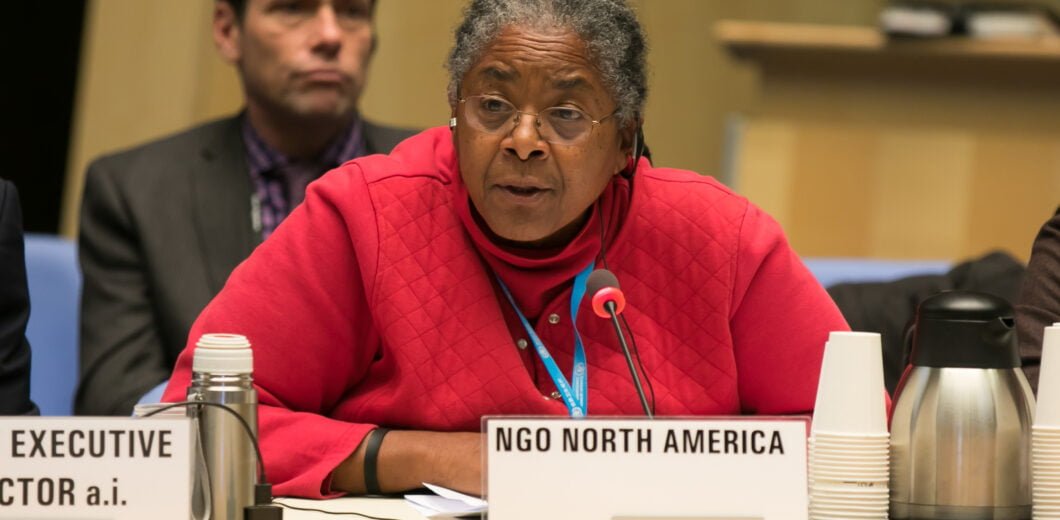Under the banner title “Refining and Reinforcing the UNAIDS Joint Programme Model,” the Global Review Panel convened a special multi-stakeholder consultation on the refinement of the UNAIDS Joint Programme operating model on Friday, 28 April 2017. More than 120 representatives from member states, Cosponsoring Organizations, the UNAIDS PCB NGO Delegation, and Civil Society Organizations attended in the day-long meeting. The review panel’s recommendations were organized around three broad pillars: financing and accountability, joint working, and governance.
Joint Working
As it was discussed during the Global Review Panel and stated many times by Member States and CSOs, the strength of UNAIDS is understood to derive from the combined expertise and experiences of a diverse range of UN agencies, guided and coordinated by a Secretariat. This approach is unique within the UN system and as stated in the Global Panel’s report, remains key to “the effectiveness of the Joint Programme [that] hinges on…the capacity of Cosponsors to engage in their mandated areas (when these are priorities for the national AIDS response), especially in the context of Agenda 2030….The principles of joint work are then pursued through various tools… designed to be flexible instruments that maximizes Cosponsors’ comparative advantages and that can be adapted based on individual country circumstances.” This understanding of joint working formed the foundation upon which the Global Review Panel undertook the ‘joint working’ review.
The review of Joint Working resulted in the following recommendation: Ensure the Joint Programme is sufficiently and efficiently financed to set the global vision to Fast-track the AIDS response with an aim to end the epidemic by 2030, deliver against its Strategy, and play its critical role in the HIV ecosystem by:
- Protecting the resources and core leadership, advocacy, and accountability functions of the Secretariat;
- Establishing a dynamic and differentiated approach to the allocation of core funding to Cosponsors that resources Joint Programme functions, including incentivizing joint work, delivering results at the country level, and facilitating the mobilization of complementary non-core resources.; and
- Identifying an appropriate proportional relationship to finance the Joint Programme’s normative, technical, and political contributions to the Global Fund to Fight AIDS, Tuberculosis, and Malaria processes.
As the discussion about joint working unfolded, what became clear was the need to discuss the –who, what, how, where, when, and with what of — the work of the Co-Sponsors and how it was to continue to take place and be maintained given the current funding landscape. Several of the attendees participated in a Unified Budget Results and Accountability Framework (UBRAF) implementation consultation held the day prior to the GRP consultation on 27 April 2017, where Cosponsors shared their efforts to achieve the global targets of 90-90-90. While the UBRAF consultation provided a review of key achievements, challenges, and the way forward in the spirit of ‘Jointing Working,” it also provided the opportunity for members of the PCB to hear firsthand how the Cosponsors are ‘joint working’ and where they are falling short.
It was agreed that the landscape had changed dramatically for all of the Cosponsors as understood and experienced by:
1) Demands for assistance that have more than doubled;
2) The global refugee crisis has more than quadrupled requests;
3) Progress toward meeting the AIDS targets has started to slow down, and
4) The civil society space that was once dominant is now shrinking globally due to increasing legal and structural barriers. It was also noted that the changing political realities of many countries have shifted the financial support, concerted will, and leadership away from AIDS and HIV to other global and domestic crises.
Recognizing the strengths and limitations, the NGO Delegation’s key messages about Joint Working included the following observations and recommendations and helped to bring much-needed attention to the gaps in capacity and funding. No one seemed to want to discuss the gaps, the lack of resources, unmet needs, and the increased demand. Instead of discussing limitations and capacity challenges, opportunities to work differently were suggested. The NGO Delegation also recognized the importance of strengthening the coordination and really delivering joint working not only in Geneva but also in the field:
“In order to increase effectiveness, retain focus and relevance, and to avoid wastage and duplication, both Secretariat and Cosponsors staff…must be accountable for delivering results at national, regional and global levels…..At regional and country levels, new cross-sectoral partnerships must be forged to leverage the contributions of the private sector, faith-based communities, academia, and science alongside government [key population networks, communities, and civil society organizations to defeat the determinants of vulnerability, including discrimination, especially among key populations, and gender inequality…UNAIDS needs to strengthen its regional support team (RST) in all regions and work closely with other UN country teams in order to support countries that are non-Fast Track but have concentrated epidemics. UNAIDS Secretariat must ensure that its role and that of UN Cosponsors are clear among civil society and community partners, especially key populations, particularly those that work on issues of decriminalization, access to treatment, prevention, and human rights, among others at the country level.”
The suggestions from the NGO Delegation asked UNAIDS to strengthen the regional capacity and in-country teams. And while the Co-Sponsors want a strong UNAIDS, they also are challenged by the shrinking resources and increased demand.
Understanding that reality, I suggested that UNAIDS undertake a review of the existing capacity of the Cosponsors in order to support an increase in their commitment to addressing and responding to HIV on the ground. The time for doing more with less has come to an end. All of the Cosponsors described and highlighted their programs, which are reaching more people, and, unfortunately in some cases, providing them fewer services. We must invest more and demand more if we are to leave no one behind.
